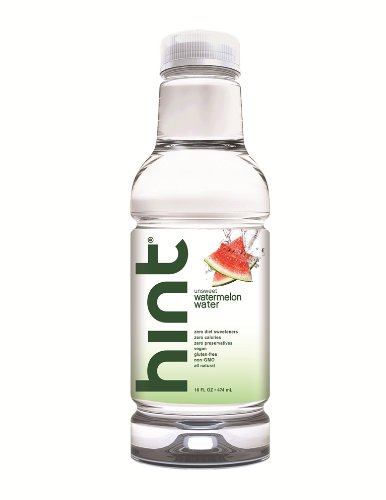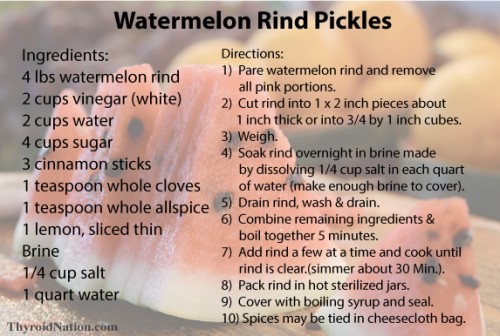
Carly Fraser, Guest
Thyroid Nation
Watermelons were said to be so important to the Egyptian culture that they were placed in the tombs of certain kings.
It’s almost that time of year again…..Summer is the time to indulge in fresh, succulent juicy melon when they are in season and deliver an array of nutrients, vitamin and minerals. It is also incredibly hydrating (up to 92% water!) and is naturally low-fat. Make watermelon a part of your daily diet and you will reap amazing benefits that range from improving cardiovascular health to nourishing your eyes, providing thyroid support and revving up your immune system. Read on to discover 9 amazing health benefits of watermelon!
Thyroid & Health
 Watermelon has a high content of water and also has some fiber. It’s sweet and filling and can be eaten between meals or as a healthy dessert that nourishes you without putting your waistline at risk. One cup has only 48 calories. When eating your watermelon, don’t spit out the seeds. Seeds have compounds that benefit your kidneys, bladder
Watermelon has a high content of water and also has some fiber. It’s sweet and filling and can be eaten between meals or as a healthy dessert that nourishes you without putting your waistline at risk. One cup has only 48 calories. When eating your watermelon, don’t spit out the seeds. Seeds have compounds that benefit your kidneys, bladder
as well as your nervous system. They have a calming effect. If you find it hard to eat the seeds, well the idea is to eat the inside part, you may want to get them in a health food store. In China, these seeds are one of the most common snacks. Watermelon seeds are rich in zinc, a vital mineral for a healthy immune system, the digestion of starchy foods and the metabolism of thyroid hormone.
Cardiovascular & Bone Health
The lycopene in watermelon is especially important for our cardiovascular health and is now being recognized as an important factor in promoting bone health. Consuming large amounts of watermelon has also been correlated with improved cardiovascular function because it improves blood flow via vasodilation (relaxation of blood pressure). Dietary lycopene (from foods like watermelon or tomatoes) reduces oxidative stress which normally reduces the activity of osteoblasts and osteoclasts (the two major bone cells involved in the pathogenesis of osteoporosis) – this means stronger bones for those consuming lycopene-rich foods. Watermelon is also rich in potassium which helps to retain calcium in your body, resulting in stronger bones and joints.
Reduces Body Fat
The citrulline in watermelon has been shown to reduce the accumulation of fat in our fat cells. Citrulline is an amino acid which converts into arginine with help from the kidneys. When our bodies absorb citrulline it can take the step of converting into arginine if so required. Citrulline, when consumed, has the ability to (through a series of steps) block the activity of TNAP (tissue-nonspecific alkaline phosphatase) which makes our fat cells create less fat, and thus helps prevent over-accumulation of body fat.
Anti-inflammatory & Antioxidant Support
Watermelon is rich in phenolic compounds like flavonoids, carotenoids, and triterpenoids. The carotenoid lycopene in watermelon is particularly beneficial in reducing inflammation and neutralizing free radicals. The tripterpenoid cucurbitacin E is also present in watermelon, which provides anti-inflammatory support by blocking activity of cyclo-oxygenase enzymes which normally lead to increased inflammatory support. Make sure you pick ripe watermelons, because they contain higher amounts of these beneficial phenolic compounds.
 Diuretic & Kidney Support
Diuretic & Kidney Support
Watermelon is a natural diuretic which helps increase the flow of urine, but does not strain the kidneys (unlike alcohol and caffeine). Watermelons helps the liver process ammonia (waste from protein digestion) which eases strain on the kidneys while getting rid of excess fluids.
Muscle & Nerve Support
Rich in potassium, watermelon is a great natural electrolyte and thus helps regulate the action of nerves and muscles in our body. Potassium determines the degree and frequency with which our muscles contract, and controls the excitation of nerves in our body.
Alkaline-forming
Watermelons have an alkaline-forming effect in the body when fully ripe. Eating lots of alkaline-forming foods (fresh, ripe, fruits and vegetables) can help reduce your risk of developing disease and illness caused by a high-acid diet (namely, meat, eggs and dairy).
Improves Eye Health
Watermelon is a wonderful source of beta-carotene (that rich red hue of watermelon = beta carotene) which is converted in the body to vitamin A. It helps produce the pigments in the retina of the eye and protects against age-related macular degeneration as well as prevents night blindness. Vitamin A also maintains healthy skin, teeth, skeletal and soft tissue, and mucus membranes.
 Immune Support, Wound Healing & Prevents Cell Damage
Immune Support, Wound Healing & Prevents Cell Damage
The vitamin C content in watermelon is astoundingly high. Vitamin C is great at improving our immune system by maintaining the redox integrity of cells and thereby protecting them from reactive oxygen species (which damages our cells and DNA). The role of vitamin C in healing wounds has also been observed in numerous studies because it is essential to the formation of new connective tissue. The enzymes involved in forming collagen (the main component of wound healing) cannot function without vitamin C. If you are suffering from any slow-healing wounds, up your intake of vitamin C heavy fruit!It’s the perfect time for this red, refreshing and thirst-quenching pumpkin’s cousin… watermelon.
Have you noticed it’s everywhere…..
This wonderful fruit is a great source of vitamins A , B6, magnesium and thiamin. It’s an excellent source of potassium and vitamin C. Watermelon helps to control blood pressure and helps to correct constipation. It energizes your body, protects your cells from free radical damage and even from cancer since it has lycopene, which is also found in tomatoes. Lycopene has powerful antioxidant effects. It’s shown that it helps to prevent certain cancers such as breast and endometrial, lung, colon and prostate cancer. According to a recent U.S. Department of Agriculture study the best way to reap the benefits of lycopene and other carotenoids found in watermelons (like beta-carotene) is by storing the fruit at room temperature. It seems the quantity of these life-saving compounds increases that way.[1]
Pits and part of the rind have sodium. So, they make great ‘watermelon‘ PICKLES! (see above)
About the Author
 Carly Fraser has her BSc (Hons.) Degree in Neuroscience, and is the owner and founder at Live Love Fruit. She currently lives in Winnipeg, Manitoba, with a determined life mission to help inspire and motivate individuals to critically think about what they put in their bodies and to find balance through nutrition and lifestyle. She has helped hundreds of thousands of individuals to re-connect with their bodies and learn self-love through proper eating habits and natural living. She loves to do yoga, dance, and immerse herself in nature. Check out the website. LiveLoveFruit.com and read the original article. Be sure to also follow her on Facebook and Twitter.
Carly Fraser has her BSc (Hons.) Degree in Neuroscience, and is the owner and founder at Live Love Fruit. She currently lives in Winnipeg, Manitoba, with a determined life mission to help inspire and motivate individuals to critically think about what they put in their bodies and to find balance through nutrition and lifestyle. She has helped hundreds of thousands of individuals to re-connect with their bodies and learn self-love through proper eating habits and natural living. She loves to do yoga, dance, and immerse herself in nature. Check out the website. LiveLoveFruit.com and read the original article. Be sure to also follow her on Facebook and Twitter.
PLEASE take a moment to ‘Like’ us on Facebook and follow us on Twitter and Pinterest. You can also listen to Tiffany and I on Thyroid Nation RADIO.
Questions or anything to add? We want your thoughts about what you eat and if you incorporate watermelon into your diet for your thyroid.




we learn every day.I love watermelon I have thyroid problems
excelent site.
thanks.
Integrative physician Dr. Mercola advises that fructose intake should be limited to 10-15 mg/day for those with a health condition (i.e., Hashimoto’s). Watermelon is on the higher end with 1/16 of a medium melon having 11.3 grams. (Info from HASHIMOTO’S THYROIDITIS ROOT CAUSE by Izabella Wentz, PharmD, FASCP)